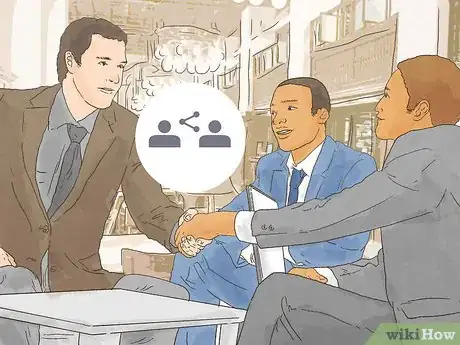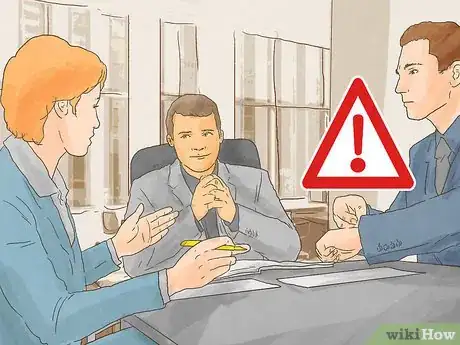wikiHow is a “wiki,” similar to Wikipedia, which means that many of our articles are co-written by multiple authors. To create this article, 20 people, some anonymous, worked to edit and improve it over time.
There are 11 references cited in this article, which can be found at the bottom of the page.
This article has been viewed 427,043 times.
Learn more...
So you've decided to enter the world of politics. It's not easy, but with the right attitude, right mindset, and the right amount of wisdom, everything is possible. In this article, you will find advice that will surely give you a huge boost in your political career, whether in the actual government or in organizations, schools, etc. Before you know it, you will be one of the most prominent politicians in your organization!
Steps
Climbing the Political Field Ladder
-
1Volunteer. The second you get your driver's license, this is an option. Odds are there's something going on somewhere in your community -- so seek it out. Go to a community meeting, find someone with an air of authority, and ask how you can help out. Step 1? Check.[1]
- Generally speaking, there's a 5-10 month window for serious volunteer work that precedes the election date, whatever election it may be. Every four years there's obviously the big presidential campaign, but every two there are smaller, state-wide campaigns that need help, too.
- If you've hit the right time, you've wandered into the wonderful world of door-knocking and making political phone calls. It's not glamorous work, but you have to start somewhere. If you find a candidate whose views align with your own, being passionate about spreading the word will be easy.
-
2Go to college. Not only is this near mandatory for your imminent political success, but it will expose you to a whole bunch of organizations and people you otherwise wouldn't know of or meet. It's best to major in political science, law, communications or statistics, depending on your ultimate goals.[2]
- Once you've got your mini-fridge and collapsible shoe rack unpacked and you've exchanged an awkward hello with your dormmate, find the organization on campus affiliated with your political party. Each campus should have one and they'll be able to get you started. Eventually, think about running for student government and being an active part of campus politics.
- While you're at it, get involved in local and municipal elections. You'll want to have as many irons in the fire as possible, small as they may be. The more people who know you, the easier it'll be to make connections and continue climbing the ladder.
Advertisement -
3Beef up your resume in other ways. Namely, with the military and nonprofit organizations. While virtually every president has been involved in some charitable initiative, 29 of the 45 presidents (let's ignore Grover Cleveland at the moment) have had some kind of military service to their name.[3]
- If you’ve ever seriously considered joining the military, this is a path that has led many people into political office. Whether you’re thinking about joining as an enlisted service member or putting the time into studying to become an officer, the leadership skills, discipline and experiences can make for an impressive political resume in the future. However, there’s far more to serving in the military than political aspirations, so make sure you’re fully aware of the responsibilities and dangers before making a final decision.
- Another career option you might want to consider is working for a nonprofit, community organization in your area. By landing a position in a community outreach program or charitable initiative, you’ll begin building a resume that demonstrates you care about helping the people around you.
-
4Become a field organizer. Alright, you've done the dirty deed of door knocking and you've met all the right people. Now it's time to be movin' on up. A field organizer is the next logical position -- you'll now be directing and recruiting volunteers to do the job you just did for either a state-wide or coordinated campaign.
- A state-wide campaign is pretty self-explanatory. You are working on behalf of a candidate that is running for some type of political office within the state. It can be anything from the Secretary of Agriculture to a senator. Sometimes the teams are quite small -- a little more than a dozen or so people can comprise the entire team (depending on the candidate and the state, obviously).
- A coordinated campaign is where you're working for the entire party, more or less. If a whole bunch of offices are open for election, sometimes campaigns merge to kill two birds with one stone (or three, or four). That way, instead of Mrs. Jenkins throwing out the third door knocker she had to be bothered by that day and subsequently switching her party affiliation, she's only contacted once and can thoroughly enjoy her free bumper sticker.
-
5Advance to a director position. Woohoo, look at you! Now that you've proven your worth, it's time to oversee the field organizers and work with county parties. You'll be speaking to various groups and truly represent the party and your candidate.
- You'll also be hiring a field staff and setting the win number once you hit Field Director material. Needless to say, the responsibilities are many.
-
6Manage a campaign. Now it's time to oversee the implementation of the entire campaign plan. You'll be assembling a team of directors (fundraising, communications, comptrollers and the treasurer) and making sure everything goes smoothly.[4]
- If your candidate wins, you're likely to receive an offer to work in the official office. So, from your perspective, it's obviously best to work with a candidate who's serious and has a likelihood of winning. From here on out, it's time for you to run for an office of your own.
Fitting the Profile
-
1Network. A large part of attaining (and keeping) political office is communicating with people.[5] Make sure you are comfortable with talking to anyone, anywhere, and be ready to network like crazy. An easy way to start doing this is going to meetings (from community to your party's national convention). Be as a public a figure within your party as possible.[6]
- Getting ahead in almost any career is often about who you know, and politics may be the best example of this. Having connections with those in office who could endorse you, big potential campaign donors, possible campaign staff, and even just everyday voters is key to being successful in politics. Any chance you have, make connections and develop friendships.
-
2Master the persona. If your Facebook is littered with photos of you dominating beer pong (as useful a skill as that may be), you may not be in the right place to represent a large number of people. Buy a suit and make sure you "fit into it" -- literally, yes, but metaphorically even more so.
- Develop an affinity for public speaking. Sadly, even if you're super qualified for the job and your opinions do align with the majority of voters, if you can't sway them to believe in you, all bets are off.
- Be energetic and passionate, regardless of the level you're at. If you're begrudgingly making phone calls or running for city council when your head is constantly in DC, it'll be recognized and you'll be written off. Be in the moment and care about the difference you're trying to make.
- Look the part. At least when it comes to the president, the better-looking candidate almost always wins. The more presidential you seem, the more you'll be trusted. The more you're trusted, the more votes you'll get. So invest in a good suit, a pair of khakis, and maybe a good trucker hat to widen your appeal.
-
3Be committed. From day one of this career path, your time will be consumed. This will become a large part of your life -- are you ready? Whether it's hours spent knocking on doors or late nights going over stats, there will be days (weeks even) when you're near running on empty. In addition, ask yourself the following questions:
- Are you okay with your entire life being displayed to the public, including your flaws? Remember that many politicians are subjected to very public scandals in their careers.
- Can you state your opinions honestly, and hold true to them even if a large portion of the population hates you for them?
- Can you be committed to having a professional demeanor under any circumstances, even trivial ones?
- Are you passionate about making decisions that will benefit the populace you are serving?
- Are you and your family prepared for a very unstable employment path, one which may see multiple years of unemployment as well as months on the road?
- If your answers are "yes," "quite easily," "obviously," "most definitely," and "why not?" then you're good to go.
Running for Your First Office
-
1Start small. While you may have huge ambitions for your political career, remember that Rome wasn’t built in a day. Politics is one of those careers wherein you really need to spend some time in the lower levels before moving up. If you are young and don’t have some pretty significant accomplishments already under your belt then this is especially the case. Here are some good starting points:[7]
- School Board: Becoming a member of your local school board is straightforward and relatively easy, and it may give you a chance to connect with some important people in your area. Having this on your resume will allow you to more easily move up the ladder.
- City Council: This will be very similar to running for a school board, but you’ll deal with more than just the education system.
- City Mayor: For smaller cities and towns, becoming Mayor likely won’t be overly difficult if you are well liked and have some experience. It is also an excellent starting point for your political career.
- State Legislator: Running for state legislature is a way to really get into the political system. Most times these politicians are paid well, and they have influence on a much broader scale than any local office. Having this on your resume gives you the ability to make the jump to the next step anytime.
-
2Believe in yourself. While it may seem a bit corny, this part is integral to success. If you don't believe in yourself, you'll call it quits at 10 PM when your opponents are burning the 2 AM oil. Knowing you have the goods is often half the battle.
- Because perseverance is so necessary for the battles you're about to endure, it's imperative that you stay motivated. You'll only keep up the drive if you believe you can ultimately better your neighborhood, community, state, and the lives of those around you. Surround yourself with others to help pick you up when you fall -- they'll help remind you to believe in yourself when it seems like the hardest thing to do.
-
3Fund raise. In order to run for any office, you need money. Ideally, this wouldn't be your own. With the years of work you've put in by now, hopefully it's not too much of an issue. Assemble a team of people you can depend on to get the collection envelopes out for you while you wine and dine prospective donors.[8]
- A good place to start is with a "Friends & Family" list. When you don't have the adequate name power, this'll be how you get the party started. Basically, you'll be hitting up everyone from that awkward college roommate to the bartender you spoke to once in your local Chili's. Think of it as a list of people that range from childhood friends to people you stood next to once at one of Barack Obama's speeches.
-
4Get everything else in order. Before you start to make preparations for your campaign, you should make sure that you have your other affairs all in line. First and foremost, make sure you have your finances all in order. If your bid for election is unsuccessful, you’ll suddenly find yourself unemployed. So before you make the decision to run for an office, make sure you have enough money saved up to last for at least a few months after the campaign is over.
- After that, make sure you settle all things well with any current employers. Let them know that you are running for office, and what the possible outcomes are. Chances are they will support you and help you as much as they can if you give them advance warning.
- Lastly, make sure your friends and family are totally aware of what your decision means. They need to know the responsibilities you’ll have if you are elected, as well as how busy you’ll be during an election year. The last thing you want to do is make someone important to you unhappy because you didn’t give them a clear picture of what would be happening.
Once the Ball is Rolling
-
1Befriend everyone. Cementing your place in politics requires a great deal of networking and socializing. Ensure that you do not get in the wrong side of people by being fair in your actions and judgments. Know when to roll up your sleeves and really make an effort -- with all types and walks of life; remember: Both a rich and poor person get one vote apiece.
- You must be the servant in the eyes of your people. Do not be self-righteous and do not expect people to serve you just because you are in politics. Instead, you must extend your help whenever you can, and you must be willing to sacrifice some personal time for your constituents whenever they need you.
-
2Spend your money wisely. Tackle the harder sectors of society, like the middle-class. Aggressive campaigning works well, but not all the time. Careful budgeting of your campaign could also gain you points, as you will not be accused of trying to "reimburse" your expenses via graft and corruption.
- So if the money is rolling in, don't feel allowed to flit off to the Canaries. Your reputation is what you're banking on right now -- don't smear your good name.
-
3Avoid scandals. If you have existing adulterous relationships, questionable sources of income, and other scandalous assets, know that they will come out. There are few secrets in politics that don't eventually get exposed.[9]
- Do your best to avoid even being an accomplice in such a circumstance. There will be dozens of people who like to see you brought down a peg -- don't let them have the satisfaction.
-
4Get yourself out there. When you have the time, organize gatherings and speeches. It's better when the people have listened to you personally rather than remembering you on a banner. It makes them trust you and appreciate the fact that you took the time to talk to them and to reach out to them.[10]
- When you're in said town hall or high school gym, be approachable. Offer help to anyone and go out of your way to shake hands. The more down-to-earth and real you are, the more of an impression you'll leave upon your people.
- Don't forget to exude a positive aura everywhere you are. Positive energy attracts publicity, but negative energy will only give mosquito press a chance to downplay your campaign. Not only that, your possible competitors will capitalize on your negativity and they will use it against you later in your future campaigns.
-
5Solidify your views. You likely already have political ideologies. But make sure you have a firm stance on every issue likely to come up during your campaign, and any potential issues that could come up if you are in office. So called “flip floppers” are politicians who change their opinions on issues. They tend to be regarded very negatively by voters. Have opinions and stick to them.
- Never, ever, ever cater your views to a certain demographic at a certain time. Your stances at a formal business dinner full of donors and your stances in a town hall should be the same. Sure, change your dress and your verbiage, but don't say what you don't mean. With all the types of media and technology available, everything you say can and will get recorded and be compared to your previous statements. You'll be automatically dismissed.
Community Q&A
-
QuestionWhy do we need to vote?
 Community AnswerTo select the person you think is best for the position and help shape the future of the government and country. If you don't care or are uninformed, you don't have to vote. But people who care about how the government works and have political opinions generally want to elect representatives who will help carry out the policies and vision for the country that they support. Voting can help make that happen.
Community AnswerTo select the person you think is best for the position and help shape the future of the government and country. If you don't care or are uninformed, you don't have to vote. But people who care about how the government works and have political opinions generally want to elect representatives who will help carry out the policies and vision for the country that they support. Voting can help make that happen. -
QuestionCan I be a politician with no qualifications?
 Community AnswerYes you can, but it will be much more difficult.
Community AnswerYes you can, but it will be much more difficult. -
QuestionI don't want to go to college, is it possible to start a political career without it?
 Community AnswerI don't think that you can get a full and rewarding political career with no college experience or reputable education. If you try the military route you could go somewhere, but I don't know of any politicians who didn't attend college.
Community AnswerI don't think that you can get a full and rewarding political career with no college experience or reputable education. If you try the military route you could go somewhere, but I don't know of any politicians who didn't attend college.
Warnings
- Do not hide anything. Hiding something often means that something is not favorable. An image of transparency is very much appreciated by people especially during these times, when trust is hard to find, and much harder to give.⧼thumbs_response⧽
- Never be self-righteous, because you might end up being called vindictive, and you will lose your credibility as a person who believes in due process.⧼thumbs_response⧽
References
- ↑ https://www.nidirect.gov.uk/articles/becoming-volunteer
- ↑ https://www.collegeconsensus.com/degrees/best-degrees-for-politics/
- ↑ https://www.military.com/history/29-american-presidents-from-military.html
- ↑ http://iknowpolitics.org/sites/default/files/political20campaign20planning20manual.pdf
- ↑ https://www.forbes.com/sites/kellyhoey/2018/11/10/ocasiocortez-networking-careerlessons/
- ↑ https://hbr.org/2011/07/managing-yourself-a-smarter-way-to-network
- ↑ https://www.youtube.com/watch?v=Aprj-3-LYuw
- ↑ https://www.dummies.com/education/politics-government/the-secret-to-fundraising-for-political-campaigns/
- ↑ https://www.npr.org/2012/01/28/145986441/the-smart-politicians-guide-to-avoiding-scandal
About This Article
To get started in politics, run for student government or join a student political organization. If you enjoy these activities, go to a community meeting and volunteer to work on a campaign. While major presidential elections only come around every 4 years, there are plenty of state elections that need help with phone calls and going door to door every other year. Finally, working for a charitable organization or with a community outreach group will help you with your future political goals! For tips on how to advance your political career, keep reading!












































































